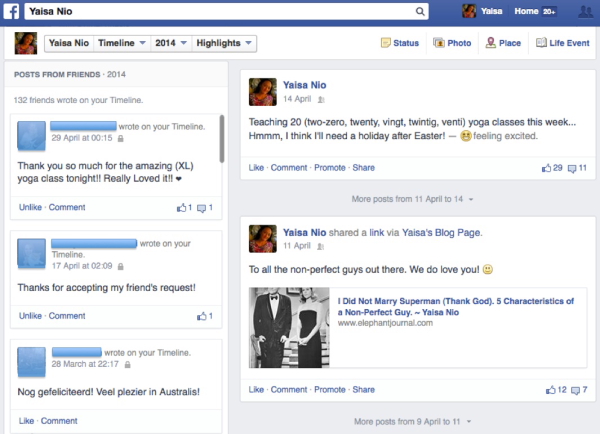Last year, a Dutch Graphic Design student graduated by writing about her fake trip to Asia.
For five weeks, she posted pictures on Facebook and had Skype conversations with friends and family as she was travelling through Thailand, Cambodia and Laos.
So they thought.
In fact, once her parents had waved her goodbye at Amsterdam Central Station, she went straight back home and made sure nobody saw her for the next five weeks. Only her boyfriend was part of the conspiracy—somebody had to do the grocery shopping.
She had pictures of the Buddhist temple in Amsterdam, of exotic fish and butterflies from the Amsterdam zoo and photoshopped herself in snapshots with typical Asian backgrounds. She decorated her bed so that she could Skype with her parents pretending she was in a hostel in Thailand.
No one ever suspected that her trip was fake until she revealed the truth. Her mom wasn’t too thrilled to find out after five weeks that her daughter had been around the corner all along.
Still, great project. I wish I’d had this idea when I was graduating. Oh wait… that was long before Skype and Facebook ever existed…
Back to the point, the hypothesis of her project: the truth is easy to manipulate and online lying occurs more often than we think.
Good point, I dare say. But new?
Manipulating the truth is an old recurring theme. We find it in Wag the Dog-like movies, in anti-photoshop campaigns. It’s used in pretty much any kind of public display ever since propaganda was invented.
>>> Enter Facebook and all the other online social networks.
Now it’s not just the politicians, religious leaders, big brands and Hollywood figures buffing up their public image on a daily basis. We—the people, the masses—are now just as guilty.
With every post, every status update, every picture we fool and trick and fake and polish and lie to our audience.
Take my Facebook profile as an example. If you are my friend, you’ll mainly see food pictures, yoga-related comments, articles I write for elephant journal and smart-ass status updates. Very occasionally, I share somebody else’s cause or link, but only if it’s really dear to me.
What my Facebook friends think is that I’m pigging out on amazing meals every day, doing yoga every morning, writing blogs like there is no tomorrow, that I’m funny and clever and not a fan of stupid jokes and clichés.
Fooled you all.
Okay, I’m not blatantly lying with my Facebook posts, but it’s not the whole truth. If anything, it’s an embellishment of the truth. My pictures are edited, carefully selected, my boring moments are not recorded and my evil thoughts are not posted—oh yes, I have them, many of them.
WYSINETITI: What You See, Is Not Everything There Is To It (especially my husband will confirm that).
So knowing my own posting behaviour, I also know not to trust somebody else’s online displays. Not 100% at least. Even disregarding extremes such as the fake trip project and compulsive liars, it is never the complete truth. An online page or profile is a window that allows a partial view into somebody’s life. The owner is in charge and decides what to post, be it total BS, a half truth or a single snapshot of a whole string of events.
So no, we should not trust somebody’s Facebook profile.
It’s not reality. At best, it’s a partial reflection. Worse case scenario, it’s a complete lie.
So what?
When have we ever known our friends and acquaintances completely and for real? Do we not all, regardless of Facebook, hide or embellish facts of our lives in the stories we tell, letters we write, faces we put up? Haven’t we all had the experience of finding out something about somebody after knowing that person for years already? Haven’t we all had those days that we really didn’t want to go out, but dragged ourselves of the couch, slapped on some makeup to look better and gotten out there with a fake smile? Haven’t we all been caught telling fisherman’s tales at some point in our life?
So yes, maybe an online profile is partial and untruthful, but that’s because we are.
We should not trust somebody’s Facebook profile. Not because it’s does not reflect the truth but precisely because it reflects who we truly are.
Relephant read:
Please Don’t Envy Me: The Facebook Status Everyone Should Read.
Love elephant and want to go steady?
Sign up for our (curated) daily and weekly newsletters!
Editor: Travis May
Photo: Screenshot of author’s own Facebook profile



Read 5 comments and reply